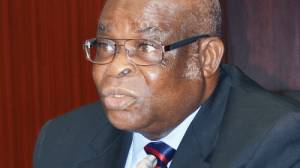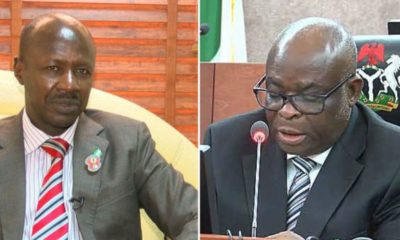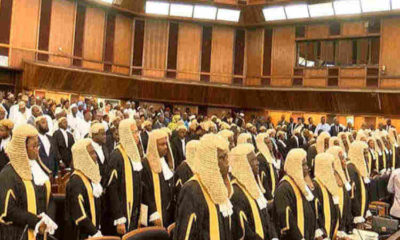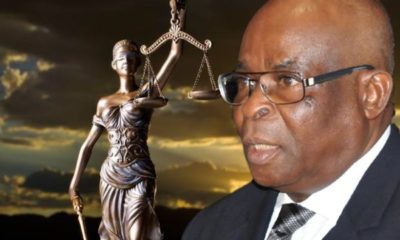News
Another More Suspicious Fund Allegedly Found In CJN Onnoghen’s Account

Eniola Olayemi
Detectives may have found more “suspicious” funds in Chief Justice of Nigeria (CJN) Walter Onnoghen’s accounts, The Nation has learnt.
There are also “suspicious” transactions, including an $800,000 Standard Chartered Bank investment subscription, sources said.
Also found is $630,000 lodged in some of the accounts through what is described as “structured payments” in tranches of $10,000 each.
Most of the lodgments, affected between 2012 and 2016, were undeclared in Justice Onnoghen’s assets declaration form, the sources claimed, pleading not to be named because of the “sensitivity” of the investigation.
The Nigerian Financial Intelligence Unit (NFIU) has restricted the operation of five accounts with about $3million
The accounts in the Standard Chartered Bank are USD No. 870001062650; Euro account No. 93001062686; Pound Sterling A/CNo. 285001062679; e-Saver Savings (Naira) account No. 5001062693; and a Naira A/C No. 0001062667.
Detectives believe that most of the lodgments and transactions are “suspicious”.
The Nation has stumbled on an intelligence report on the CJN’s accounts, which reads in part: “Pattern of structured payments of $10,000.00 each in 2012. For example, a total of $630,000.00 was credited to the accounts using this pattern.
”Similarly structured payments of $10,000.00 amounting to $297,800.00, $50,000.00 and $36,000.00 were deposited in the account in 2013, 2015 and 2016 respectively.
“There was also a credit of $121,116.00 into the account from 2014 to 2016 from Life Friend Plc. The payments were in four installments, of $30,279.00 each. These payments suggest the suspect has investments.
“A payment at $482,966.00 from Alicia Redemption Pro and shortly after, $800,000.00 was invested in SCB Investment subscription. We are in the process of verifying these transactions;
“Other suspicious transactions in the account are credit of $19,764.00 from Pur of Noble and seven (7) payments of $3,250.00, each amounting to $22,750.00 from Lloyds TSB.
On the pound sterling (GBP), the investigative team discovered “a self- transfer of £40,268.40 into the
Account on May 31 2016.”
“There were also self-deposits by the suspect of £49,760.00 from July 2015 to September, 2016
but the balance as at September 30, 2016 was £108,348.00,” the report added.
Regarding the Naira account, the report said: “The following highlights some of the suspicious activities in the account: A transfer of N41, 262.000.00 ($260,000) was made from the dollar account. The money was used to make payment of N41million to Ad hoc Committee on the Sale of Federal Government Houses, suggesting that he bought a property with proceeds of the transfer;
“The only other significant transactions in the accounts are six (6) structured cash payments of N500,000.00 each and one payment of N700,000.00 amounting to N3.7mlllion from November, 2013 to August, 2016.
All the transactions, sources said, are being investigated whether or not they violated the “Revised Code of Conduct for Judicial Officers of the Federal Republic of Nigeria” which was put in place by the National Judicial Council.
Sections 7 and 13(4and5) of the Code of Conduct deal with financial interests.
Section 7 reads: “7.1 A Judge shall inform himself or herself about his or her personal and fiduciary financial interests and shall make reasonable efforts to be informed about the financial interests of members of the Judge’s family in respect of matters for adjudication before him.
“7.2 If it appears in respect of a matter before him or her, that the Judge, or a member of the Judge’s family or other person in respect of which the Judge is in a fiduciary relationship, is likely to benefit financially, the Judge has no alternative but to withdraw from the case.
“7.3 For the purpose of this rule, “Financial interest” includes ownership of a legal or equitable interest, however small, or a relationship as director, advisor, or other active participants in the affairs of an institution or organization. The following are not to be regarded as financial interests:
- The proprietary interest of a policy holder in a mutual insurance company, unless the outcome of any proceeding could substantially affect the value of the interest.
- Ownership of government securities unless if the outcome of any proceeding could substantially affect the value of the security.
“For the purpose of the Rules contained in this Code –
(a) “Fiduciary” includes such relationships as executor, administrator, trustee and guardian;
(b) “financial interest” means ownership in a substantial manner of a legal or equitable interest, or a relationship as director, adviser or other active participation in the affairs of a party except that:
(i) ownership in a mutual or common investment fund which holds securities, unless the Judicial Officer participates in the management of the fund;
(ii) an officer in an educational, religious, charitable or civil organization is not a “financial interest” in securities held by the organization;
(iii) the proprietary interest of a policy holder in a mutual savings’ society or similar proprietary interest, is a “financial interest” in the organization only if the outcome of the proceedings could substantially affect the value of the interest; and
(iv) ownership of government securities is a “financial interest” in the issues only if the outcome of the proceedings could substantially affect the value of the securities.”
Section 13.4 and 5 deal with Business and Financial Activities of judges.
Section 13. 4 says: (i) A Judicial Officer may own investments and real property PROVIDED that in the management of his investments, he shall not serve as an officer, director, manager, general partner, adviser or employee of any business entity.
(ii) Otherwise permissible investment or business activities are prohibited if they:
(a) Tend to reflect adversely on judicial impartiality,
(b) Interfere with the proper performance of judicial duties,
(c) Exploit the judicial position; or
(d) Involve the Judicial Officer in frequent transactions with legal practitioners or with people likely to come before the Judicial Officer’s court.
13.5 Acceptance of Gifts
A Judicial Officer and members of his family shall neither ask for nor accept any gift, bequest, favour or loan on account of anything done or omitted to be done by him in the discharge of his duties.
A Judicial Officer is, however, permitted to accept:
(i) Personal gifts or benefits from relatives or personal friends to such extent and on such occasions as are recognized by custom.
(ii) Books supplied by publishers on a complimentary basis.
(iii) A loan from lending institution in its regular course of business on the same terms generally available to people who are not judicial Officers;
(iv) A scholarship or fellowship awarded on the same terms applied to other applicants.”6












